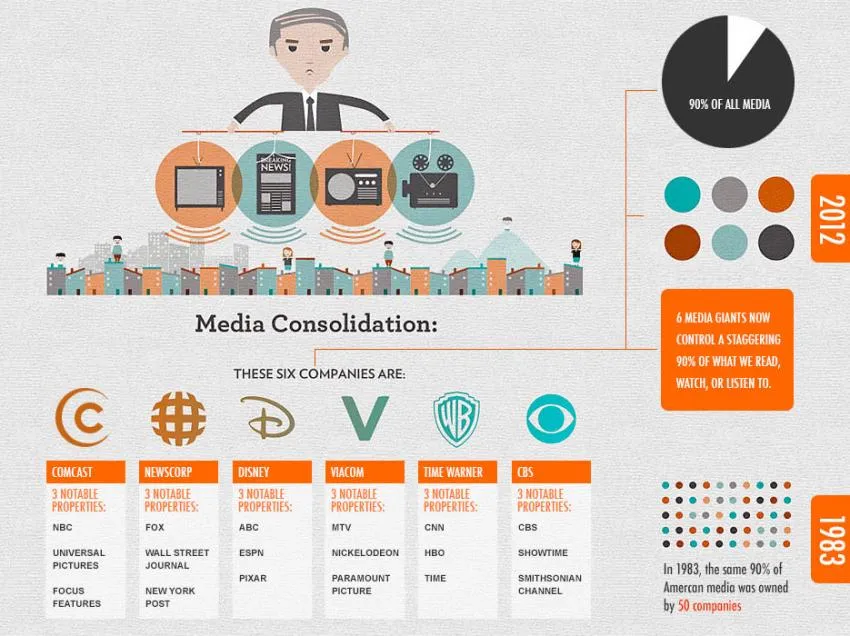Why Aren’t There Any Trustworthy News Sources Anymore

News and journalism are trades as old as civilization itself. The history and evolution of journalism are fascinating especially considering what it now consists of.
Journalism and reporting news has historically been a highly-touted profession of integrity and honor. In contrast, modern-day reporting feels to be at odds with the public. Maybe the worst part about it, is that much of the general public are blissfully unaware of that fact and that is intentional.
The personalization of news feeds, elite minority ownership of mass media and rampant misinformation through social media has made the majority of present day news sources untrustworthy at best.
1. Personalization of News
As per NiemanReports the news you see on your phone, computer, and even within your own Google searches has been tailored to you. You are being fed information that has been determined by an algorithm in an attempt to capture and hold your attention.
Your Google search history, geographical location, demographical information and more are all taken into account when you search for news. What you see is likely entirely different than what someone else sees who lives across the country, who is a different race or religion, or sits on the other side of the political aisle.
As a result, it is pretty easy to find a bubble of information that confirms your bias and supports your personal opinion. These are commonly referred to as "echo chambers" and often come with much resistance or complete omission of opposing information.
2. Mass Media Is Owned By The Elite Minority

In 1983, 90% of the media was owned by 50 different companies. By 2012, 90% of the media was owned by 6 companies.
These 6 companies majorly control what you read, watch and listen to. Every single day. It applies across the board, regardless of your beliefs, bias, and politics. It is easy to think “well, I know the news I see is legitimate and is not trying to deceive me.”
Furthermore, it contributes to the likelihood of someone dismissing information from another source, since it does not match up with their favorite news outlet. Regardless, even if you did “choose” to get your information from another source, that choice is an illusion as well, considering the fact that you will be fed whatever information that alternate source wants to feed you as well.
John Mayer's 2006 song 'Waiting On The World To Change' laid out a cautionary tale in reference to this illusion. “When you trust your television, what you get is what you got. ‘Cause when they own the information, they can bend it all they want.” He hit the nail on the head.
Take this Sinclair Broadcasting script for example as well. This should concern anyone who watches it. This video has 4.5 million views and took me 10 minutes to find on YouTube while having to sift through mainstream media coverage about this exact video.
3. Social Media Is Now A News Source
Social media has absolutely erupted in popularity over the last decade. It can be a fantastic tool for connecting with loved ones, sharing adorable videos of your pets, and taking your mind off of daily stressors.
Unfortunately, it has also become a threatening source of misinformation and a very easy way to spread fallacy. There has also been a creation of Bots - fake accounts not even run by real humans - that can easily spread whatever information it wants.
So many internet and social media users fall victim to spreading information that may not have even come from real users. Indiana University researched fake news and social media.
The echo chamber absolutely plays a role here as well; if your friends and family share something to their social media account, it is easy to believe it as true. Why would your family member be spreading lies? Sadly, your family member themselves may be entirely unaware that they are spreading incorrect information as well.
Can we hold news sources accountable?
How can we trust anything we see or hear anymore? Cornell University has some tips that may help you get a better grasp on what information you are digesting.
Unfortunately, it seems to be incumbent on the consumers to decide what is good information. There is some hope, with available lists of more trustworthy news sources that still produce factual information. It is a little disheartening that these articles themselves may inspire doubt in those who read them, due to all the reasons I’ve now listed above.
Hopefully, the general public will become more and more aware of these issues, allowing us to combat misinformation and be a more truthfully informed populous.
Opinions and Perspectives
The evolution of journalism described in the article feels like a cautionary tale.
We need to find a balance between staying informed and maintaining our sanity.
The article's point about echo chambers explains why family gatherings have become so politically tense.
Reading this makes me appreciate the few remaining independent news organizations even more.
The solution might be teaching people to be their own journalists and verify everything.
Watching how breaking news evolves over 24 hours shows how unreliable initial reporting can be.
The part about algorithms reminds me why I started using private browsing mode for news.
Sometimes I think returning to print newspapers wouldn't be such a bad idea.
I'm going to share this article with my social media groups. People need to understand these issues.
The comparison to historical journalism standards really highlights how far we've fallen.
Maybe we need AI to help us fact-check news. Humans clearly can't keep up.
Anyone else feeling exhausted trying to figure out what's true and what isn't?
The article's point about family members unknowingly spreading misinformation hits close to home.
I've noticed how news websites change headlines throughout the day to maximize clicks.
The mention of the Sinclair Broadcasting script reminds me why local news isn't as trustworthy as it used to be.
We need to support independent journalism financially if we want it to survive.
Interesting how the article mentions pet videos as a positive aspect of social media. Even those can be manipulated.
The speed of news distribution is part of the problem. Everyone races to be first rather than accurate.
I find myself cross-referencing multiple sources before believing anything these days.
My journalism professor warned us about this trend years ago. Wish we'd listened sooner.
The article barely touches on the role of advertising in all this. Follow the money and you'll find the truth.
I've started using media bias fact check websites before sharing anything. It takes time but feels necessary.
Trust in media institutions won't improve until ownership becomes more diverse again.
The part about Google search results being personalized was news to me. No wonder we can't agree on anything anymore.
Been following independent journalists on Substack. It's refreshing to read unfiltered perspectives.
Wonder what future generations will think when they look back at this period of information chaos.
I appreciate how this article connects historical context with current issues in journalism.
The decline in local journalism has made this problem even worse. We need more boots-on-the-ground reporting.
Looking at my parents' Facebook feeds compared to mine is like viewing parallel universes.
I'm particularly concerned about how this affects political discourse. We can't have meaningful debates if we can't agree on basic facts.
The article makes good points about algorithmic news feeds, but I think human bias is still a bigger problem.
Sometimes I feel overwhelmed by all this information. How do we stay informed without getting lost in the noise?
We need to teach critical thinking skills alongside technical literacy. One without the other isn't enough.
The part about echo chambers really resonates. I've watched friends fall deeper into their bubbles over time.
I've started reading international news sources to get different perspectives. It's fascinating how they cover American news.
The comparison between 1983 and 2012 media ownership statistics is eye-opening. Wonder what the numbers are now.
Anyone else remember when we just had evening news and morning papers? Maybe simpler was better.
I'm curious about solutions. Seems like the article points out problems but doesn't offer many concrete fixes.
The mention of bots spreading misinformation is scary. How many of the posts we interact with are even real?
This article made me realize why my uncle and I can never agree on anything news-related. We're literally seeing different versions of reality.
I've noticed how different news channels report the same story in completely opposite ways. It's mind-boggling.
Social media has made everyone think they're a journalist. That's part of the problem.
The Cornell University tips mentioned in the article are helpful, but they should be common knowledge by now.
I tried explaining these concepts to my kids. It's crucial they understand this from an early age.
This whole situation reminds me of that old saying about not believing everything you read. Now it's more relevant than ever.
We should bring back the Fairness Doctrine. The current system clearly isn't working.
The personalization of news feeds makes me wonder if we're all living in completely different realities.
I've started following local independent journalists. They might not have fancy production values, but at least they're not controlled by big corporations.
The article's suggestions about fact-checking are good, but who has time to verify every single news story they read?
My grandmother still believes everything she sees on TV news. It's hard to explain to her why she shouldn't.
Looking back at how media ownership changed from 50 companies to just 6 is shocking. We need anti-trust action.
The bot problem on social media is worse than most people realize. I've learned to check account histories before believing anything.
I started using news aggregators that pull from various sources. It helps me see different perspectives on the same story.
Does anyone else find it ironic that we're reading an article about untrustworthy news sources? How do we know this one is trustworthy?
I work in digital marketing and can confirm the personalization algorithms are even more sophisticated than what's described here.
The John Mayer lyrics quoted in the article are surprisingly profound. He saw this coming years ago.
We need better media literacy education in schools. People need to learn how to spot fake news early on.
What really struck me was the part about the Sinclair Broadcasting script. I watched that video and it gave me chills.
The echo chamber effect is real. I tested this by creating two different profiles with opposite political views. The news feeds were completely different.
I've noticed how my relatives share obviously fake news on social media without fact-checking. It's becoming a real problem.
Remember when journalism was about uncovering truth rather than getting clicks? Those were the days.
This article really opened my eyes about how algorithms shape what news I see. I'm going to start diversifying my sources.
I actually disagree about social media being all bad for news. It's helped expose stories that traditional media wouldn't cover.
The consolidation of media ownership is what really concerns me. Six companies controlling 90% of what we see? That's just scary.
I find it terrifying how news has become so personalized. My feed is completely different from my friend's even though we live in the same city.
